-
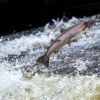 +19 +1
+19 +1Warming Waters Challenge Atlantic Salmon, Both Wild and Farmed
Higher ocean and river temperatures are stressing Atlantic salmon, depriving these iconic fish of oxygen and forcing them to swim farther to find food. These climate-change pressures are also impacting salmon in ocean farms, which have seen an increase in mass die-offs.
-
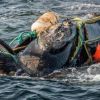 +12 +1
+12 +1US lobster put on ‘red list’ to protect endangered North Atlantic right whales
Lobster nets and pots have become such a threat to the survival of critically endangered North Atlantic right whales that the crustaceans have been “red-listed” as seafood to avoid by a major fish sustainability guide. Fewer than 340 of these whales exist today, including only 80 breeding females. The population is estimated to have dwindled by 28% over the past decade.
-
 +18 +1
+18 +1Scientists make major breakthrough in race to save Caribbean coral
Scientists at the Florida Aquarium have made a breakthrough in the race to save Caribbean coral: For the first time, marine biologists have successfully reproduced elkhorn coral, a critical species, using aquarium technology. It’s a historic step forward, and one they hope could help revitalize Caribbean ecosystems and could pay humans back by offering extra protection from the fury of hurricanes.
-
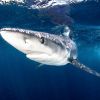 +14 +1
+14 +1The Sharks Are Back This Summer. We’re Not Ready for What That Really Means.
About 10 years ago, I saw a shark leap out of the water from somewhere near Beach 108th Street in Rockaway Beach, Queens. I had come out with friends to swim on a hot weekend day and just happened to be gazing out at the right moment. The shark breached, was airborne for a single second, and then landed with an inaudible splash about a mile from shore.
-
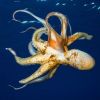 +18 +1
+18 +1Are octopuses too intelligent to eat?
Oil-crisped tentacles, paper-thin carpaccio and octopus meat plump from slow-cooking have been popping up on restaurant menus across the country, where the long-time Mediterranean ‘superfood’ is fast being adopted as the British gourmand’s dinner-plate darling. What was once an exotic holiday meal is now consumed to the tune of 1,300 tons per year in the UK, up 12-fold since 1990. In the decade to 2019, the global trade doubled to a value of more than £2 billion.
-
 +13 +1
+13 +1‘Magnificent’ jellyfish found off coast of Papua New Guinea sparks interest among researchers
A diver has captured footage of an unusual-looking jellyfish off the coast of Papua New Guinea, sparking interest among researchers. The video was captured by Dorian Borcherds, who owns Scuba Ventures in Kavieng, in the New Ireland province of PNG.
-
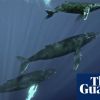 +3 +1
+3 +1‘Nowhere is free from noise’: deep-sea mining threat to marine mammals
Noise pollution from proposed deep-sea mining could radiate through the ocean for hundreds of kilometres, scientists predict, creating a “cylinder of sound” from the surface to the sea bed.
-
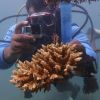 +10 +1
+10 +1To combat coral bleaching, Kenya turns to reef nurseries
Minutes away from the Kenyan mainland, the densely forested island of Wasini is one of several starting lines for coral reef restoration efforts in the western Indian Ocean. On a rare calm day during the normally turbulent monsoon season, four divers, carrying measuring equipment, shoes and toothbrushes descended in turns to the sea-bed reef restoration site on the Shimoni channel.
-
 +11 +1
+11 +1Australia says most Great Barrier Reef coral studied this year was bleached
More than 90% of Great Barrier Reef coral surveyed this year was bleached in the fourth such mass event in seven years in the world's largest coral reef ecosystem, Australian government scientists said. Bleaching is caused by global warming, but this is the reef's first bleaching event during a La Niña weather pattern, which is associated with cooler Pacific Ocean temperatures, the Great Barrier Reef Marine Authority said in its an annual report released late Tuesday that found 91% of the areas surveyed were affected.
-
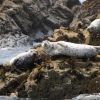 +4 +1
+4 +1‘Rats of the sea’: backlash after Cornish fishers call for seal cull
Seals are the “rats of the sea” and should be culled, a group of Cornish fishers have said. Marine campaign groups hit back after fishers on an online marketplace and forum expressed anger about the amount of fish seals eat.
-
 +18 +1
+18 +1‘Unusual’ deep-sea jellyfish discovered off California coast
Scientists have discovered an “unusual” new species of deep-sea jellyfish living in the waters off the California coast. The creature, a type of Atolla jellyfish, was discovered by scientists at the Monterey Bay Aquarium Research Institute (MBARI). It lives in the so-called midnight zone of the ocean – between one and four kilometers deep – a mysterious region where light only comes from animals that produce it themselves and the pressure reaches 5,580 pounds a square inch.
-
 +14 +1
+14 +1Hidden World of Octopus Cities and Culture Shows why it's Wrong to Farm These Sentient Creatures
A recently proposed aquaculture octopus farm in the Canary Islands would raise 3,000 tonnes of octopus a year, which means almost 275,000 individual octopuses will be killed annually.
-
 +15 +1
+15 +1Deep-Sea Octopuses Are Making Shelters Out Of Human Trash
One man’s trash is an octopus’ treasure. A group of researchers from Italy and Brazil wanted to take a closer at how deep-sea octopuses interact with trash that makes its way to the ocean after being discarded by humans.
-
 +3 +1
+3 +1Underwater cables stop crabs in their tracks
Brown crabs can’t resist the electromagnetic pull of underwater power cables and it’s changing their behaviour, marine scientists say. The team behind a new study says the power cables linked to offshore renewable energy devices affect how crabs interact with the environment.
-
 +13 +1
+13 +1Scientists are recruiting elephant seals to eavesdrop on whales
Roughly a decade ago, a team of biologists glued audio recording devices onto the backs of a handful of elephant seals on the California coast. They wanted to know if the seals — identified as males by their cartoonish faces with trunk-like noses — make noises as they swim out to sea in search of food.
-
 +19 +1
+19 +1Scotland hopes to save wild salmon by planting millions of trees next to rivers
River Dee initiative comes as rising water temperature from climate heating threatens species’ survival
-
 +10 +1
+10 +1Great Barrier Reef on verge of another mass bleaching after highest temperatures on record
Temperatures over the Great Barrier Reef in December were the highest on record with “alarming” levels of heat that have put the ocean jewel on the verge of another mass bleaching of corals, according to analysis from US government scientists seen by Guardian Australia.
-
 +13 +1
+13 +1Methuselah: oldest aquarium fish lives in San Francisco and likes belly rubs
Meet Methuselah, the fish that likes to eat fresh figs, get belly rubs and is believed to be the oldest living aquarium fish in the world. In the Bible, Methuselah was Noah’s grandfather and was said to have lived to be 969 years old. Methuselah the fish is not quite that ancient, but biologists at the California Academy of Sciences believe it is about 90 years old, with no known living peers.
-
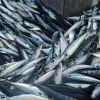 +3 +1
+3 +1Holy Mackerel, Where’d You Go?
A beloved fish with a rich history has become hard to find—will it rise again?
-
 +4 +1
+4 +1Biologists Shocked to Find Millions of Icefish Nesting Near Antarctica
Deep-sea biologists were stunned to find the largest known fish breeding ground, a discovery made last year near Antarctica. Details of the incredible find were published today, with researchers describing a sprawling colony of millions of icefish on seafloor of the Southern Ocean.
Submit a link
Start a discussion




















